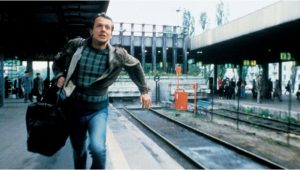Is there such a thing as fate? Is your future written in the stars? Or does it hang in the balance of a radical contingency? You run to catch a train and depending on what happens next you end up a committed Communist trying to reform the party from within, or a dissident fighting the power of the party, or an apolitical doctor keeping your head down.
Blind Chance is a product of the Polish director, Krzysztof Kieślowski, one of the masters of European cinema, especially well-regarded for films he made in France in the 1990s. His films were never simply political or ideological. They took up existential questions, exploring characters, their lives, the search for meaning in a complex universe. He described himself as “a pessimist. I always imagine the worst. To me the future is a black hole.”
The film tells the story of a young man in Communist Poland: Witek, an earnest young medical student. Facing an unclear future, he chooses to put his education on hold. Witek rushes to catch the last train to Warsaw. What follows depends upon whether he catches the train or not. The film is a tribute to the contingency of our lives. The same young man can live very different lives. All of them, however, will be defined by his relationship to the authorities.
This is not a political film, but the politics of the era loom in the background. Witek was born in 1956 – in the midst of the Poznan Riots of June 1956 (yes, the unrest that would bring W. Gomulka to power). Witek sees something of the anti-semitic purges of 1968. He graduates medical school in 1978. We see him in his various lives in 1979 and 1980, a moment of political crisis in Poland. Around him there are challenges to the system from students, the Catholic Church, and workers movements.
And the film would be caught in history and politics as well. It was completed in 1981 but by then the Polish authorities had declared martial law. The film was banned and would not be screened in Poland until 1987.
What did you see in the film? What can it tell us about the era in which it was made? Does this meditation on fate and contingency have anything to tell us today?

